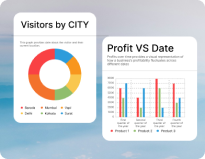Introduction
Understanding your customers and their behavior is crucial so here are some best ways Improve your website. Analytics and insights play a pivotal role in unraveling the intricacies of consumer preferences and trends. Leveraging this data efficiently can catapult your e-commerce website to new heights of success. By deciphering valuable insights, you can refine your strategies and provide an enhanced shopping experience. Let’s explore seven powerful ways to utilize analytics and insights to elevate your e-commerce business.
Embracing Data-Driven Decision Making Is One Of Best ways

To truly understand and cater to your customers, you need to embrace data-driven decision making. Utilize analytical tools to comprehend customer behavior patterns, preferences, and purchasing habits. By analyzing this data, you can make informed decisions to enhance user experience and streamline your offerings.
Personalization: Key to Customer Engagement

Utilize insights to personalize the customer experience. Tailor product recommendations, offers, and marketing campaigns based on customer preferences and past interactions. A personalized approach fosters a sense of exclusivity and connection, leading to increased customer engagement and loyalty.
Optimizing Website Performance

Analytics can provide valuable insights into your website’s performance. Monitor metrics such as page load times, bounce rates, and navigation patterns to identify areas for improvement. By optimizing website performance, you can ensure a seamless and satisfying shopping experience, driving customer retention and satisfaction.
Leveraging Social Media Insights
Social media platforms one of the best ways that offer a treasure trove of insights into customer sentiments and trends. Monitor and analyze social media metrics to gauge customer feedback, preferences, and emerging market trends. Leverage this data to tailor your marketing strategies and engage with your target audience effectively.
Enhancing Inventory Management
Efficient inventory management is vital for the smooth operation of an e-commerce business. Leverage analytics to gain insights into product demand, popular categories, and inventory turnover rates. By understanding these patterns, you can streamline inventory management, avoid stockouts, and ensure timely restocking, thereby enhancing customer satisfaction.
Streamlining the Checkout Process

Analyze the checkout process to identify potential bottlenecks and areas for improvement. Simplify the checkout process to minimize cart abandonment rates. Implement features such as guest checkouts, multiple payment options, and streamlined forms to create a hassle-free and efficient shopping experience.
Monitoring and Adapting to Market Trends

Staying updated with evolving market trends one of the best ways to imperative for sustained success. Regularly monitor market trends, consumer preferences, and competitor strategies using analytics. Adapt your offerings and strategies accordingly to stay ahead of the curve and maintain your competitive edge.
Analytics and Insights: Harnessing Data to Improve Your E-commerce Website
Harnessing the power of analytics and insights can truly transform the trajectory of your e-commerce website. By making data-driven decisions, personalizing the customer experience, optimizing website performance, leveraging social media insights, enhancing inventory management, streamlining the checkout process, and monitoring market trends, you can ensure sustained growth and customer satisfaction.
Conclusion
In conclusion, embracing analytics is essential for any e-commerce website aiming for sustainable growth. By implementing the 7 effective strategies outlined in this guide, you can unlock the full potential of analytics and drive your e-commerce business towards success.
Frequently Ask Questions?(FAQs)
How often should I analyze my e-commerce website's analytics?
Regular analysis is crucial. Aim for weekly reviews to stay updated with evolving trends and make timely adjustments.
How Can Ecommerce Boost Sales?Can analytics help in identifying potential customer segments?
Absolutely. Analytics can provide valuable insights into customer demographics and preferences, allowing you to identify and target specific customer segments effectively.
What are the key metrics to monitor for website performance optimization?
Key metrics include page load times, bounce rates, conversion rates, and overall user engagement metrics.














